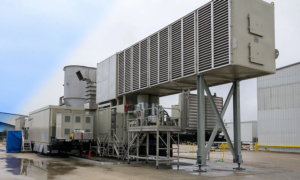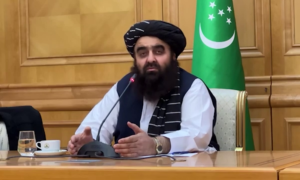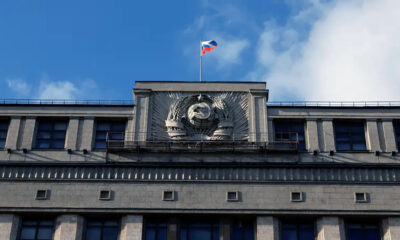Latest News
Afghanistan’s deputy PM orders review of new dam and gas-fired power project plans
Mullah Abdul Ghani Baradar chaired a regular meeting of the Economic Commission where a number of draft proposals for projects, including power generating plans, were discussed

At a regular Economic Commission meeting this week, discussions centered around a number of key projects including the construction of a second Surobi Dam in Kabul province and the production of 300 megawatts of electricity from natural gas in Jawzjan province.
According to a statement issued by the office of Mullah Abdul Ghani Baradar, the deputy prime minister for economic affairs, a draft proposal for construction materials for the ministry of mines and petroleum was also discussed.
Chaired by Baradar, the meeting involved comprehensive discussions on these critical issues, the statement read.
The ministry of water and energy was tasked with conducting technical discussions with various companies regarding the construction of the second Surobi Dam.
The ministry was also urged to consider the Economic Commission's opinions and present its findings in a report to the commission.
Technical discussions with the company proposing the 300-megawatt gas-fired electricity project in Jawzjan province set to take place
Additionally, the ministry of water and energy was instructed to engage in technical discussions with the company proposing the 300-megawatt gas-fired electricity project in Jawzjan province.
These discussions will involve representatives from the ministry of mines and petroleum, who will submit a detailed report to the Economic Commission on the project's feasibility and on technical aspects, the statement read.
The commission also addressed a draft proposal from the ministry of mines and petroleum concerning construction materials, including sand, gravel, and bricks.
[caption id="attachment_608807" align="alignnone" width="1000"]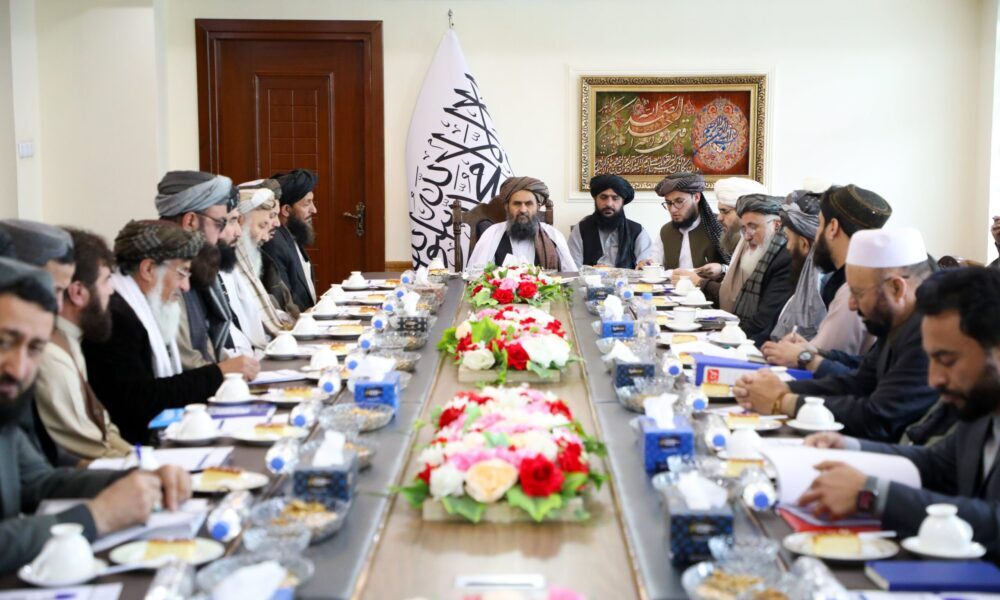 The Economic Commission, chaired by Mullah Baradar, met this week in Kabul[/caption]
The Economic Commission, chaired by Mullah Baradar, met this week in Kabul[/caption]
After a thorough evaluation of the draft proposal, the task of finalizing the proposal was assigned to a committee led by the ministry of mines and petroleum.
Once the proposal has been finalized it will be sent to the office of the Islamic Emirate’s supreme leader for approval.
Powering Afghanistan
Energy production is a priority for the Islamic Emirate government as currently it relies on neighboring countries to supply it with over 50 percent of its current electricity needs.
While hydroelectric dam projects are high on the priority list for the government, gas-fired power generating projects are also being carefully considered - especially as Afghanistan has an estimated reserve of about 15 billion cubic feet of natural gas.
Currently, there are gas fields in nine areas of Jawzjan province and the IEA continues to encourage investment in the natural gas to electricity sector.
This process in the country is not however new, as one trailblazer has been successfully supplying electricity to hundreds of thousands of people for the past few years.
The company is Bayat Power, Afghanistan’s largest, Afghan-owned and operated power production company - which boasts the region’s most technologically advanced gas fired electric power plant.
Launched in 2019, this commercial operation provides reliable and affordable electric power to hundreds of thousands of people in the country.
Located in Sheberghan, in gas-rich Jawzjan province, Bayat Power has steadfastly aimed to provide essential power for Afghanistan’s economic growth.
[caption id="attachment_579897" align="alignnone" width="1000"]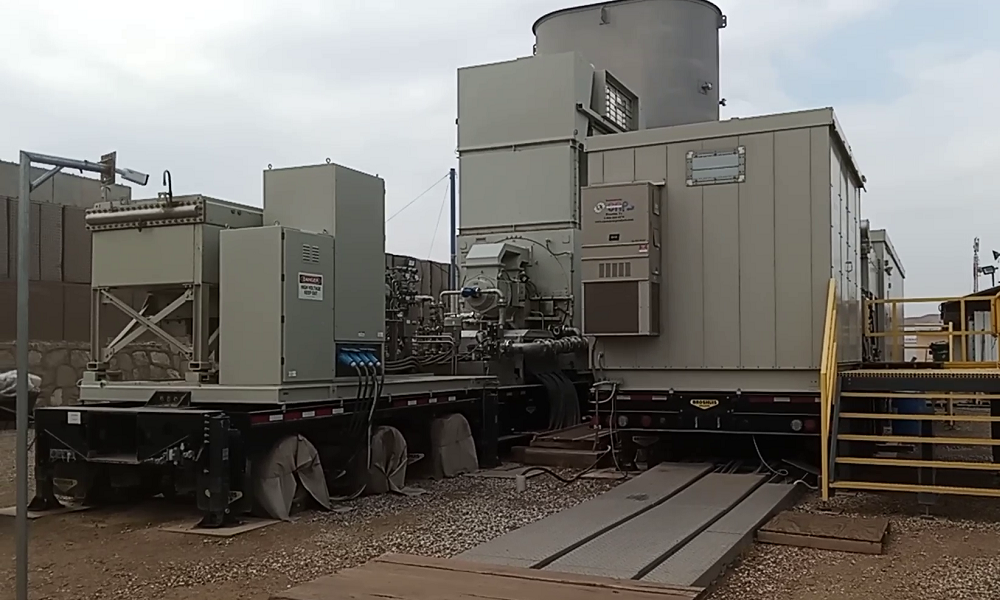 Bayat Power's Siemens SGT-A45 ‘Fast Power’ turbine is the world’s most advanced mobile gas to energy power solution[/caption]
Bayat Power's Siemens SGT-A45 ‘Fast Power’ turbine is the world’s most advanced mobile gas to energy power solution[/caption]
Powered by a Siemens SGT-A45 ‘Fast Power’ turbine, the world’s most advanced mobile gas to energy power solution, phase one of Bayat Power-1’s operations generates up to 44 megawatts of power for Afghan homes and businesses.
To date, Bayat Power has delivered well over one billion kilowatts of domestic power to the Afghan grid.
However, Bayat Power hopes to eventually roll out three phases in total that will generate more than 200 megawatts of electricity – enough to serve millions of Afghan residential and commercial clients.
Since its launch five years ago, the power plan has generated significant tax revenues for the government, created thousands of direct and indirect job opportunities for Afghans, contributed to the nation’s economic condition and fostered new technical skill sets amongst talented citizens.
In recognition of Bayat Power’s commitment to the country and its people, the company was awarded the prestigious Asian Gas Power Award 2023 last year.
[caption id="attachment_579601" align="alignnone" width="1000"]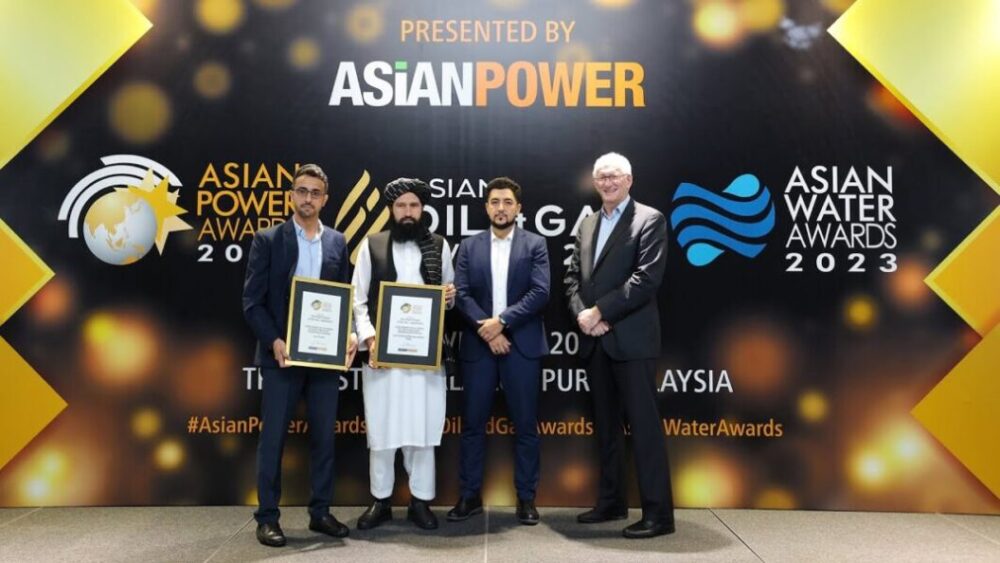 Bayat Power awarded the prestigious Asian Gas Power Award 2023[/caption]
Bayat Power awarded the prestigious Asian Gas Power Award 2023[/caption]
At the time, Bayat Power’s CEO Ali Kasemi said it was an honor and a privilege for the company to receive the accolade. He also said the award was an acknowledgement of the hard work and tenacity of Afghans in their quest for energy security and self-sufficiency in the power sector.
“Bayat Power is extremely proud that the Asian Power Awards have recognized our project as the Gas Power Project of the Year in Afghanistan. But we are even prouder of our continued efforts to improve the lives of Afghans across the country, enabling students to study at night, allowing health workers to provide critical services 24/7, supporting factory production, and lighting up cities, streets, mosques, schools and homes nationwide,” said Kasemi.
RELATED STORIES:
Bayat Power set to launch phase two of its gas to electricity power generating project
Turkmenistan pledges to increase power, gas exports to Afghanistan: Muttaqi
Latest News
Russian law paves way to recognise Islamic Emirate of Afghanistan
No country currently recognises the IEA government which regained control of Afghanistan in August 2021.
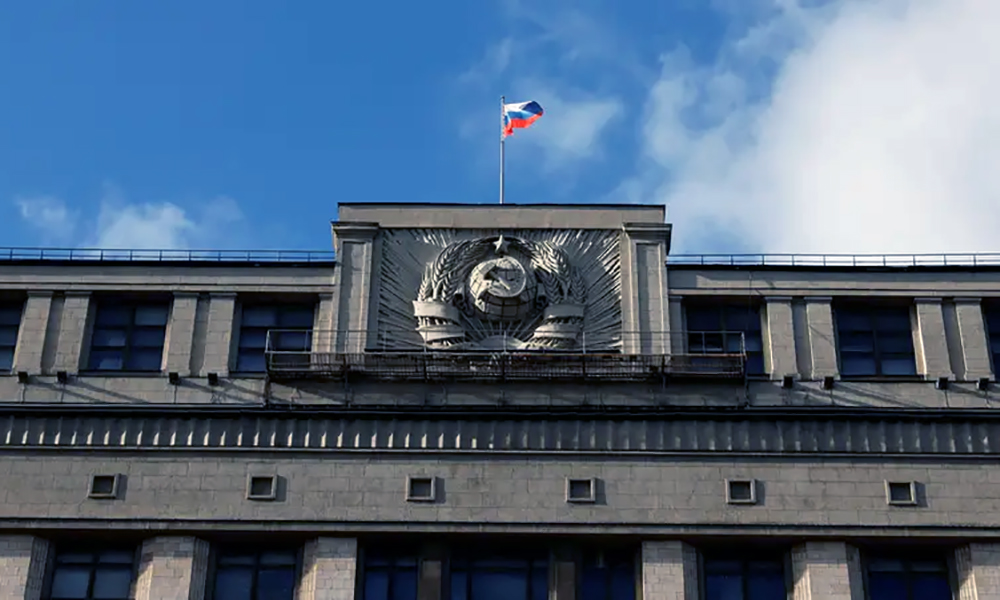
Russia's parliament passed a law on Tuesday that would allow courts to suspend bans on groups designated by Moscow as terrorist organisations - paving the way for it to normalise ties with the Islamic Emirate of Afghanistan annd potentially with the new leadership of Syria.
No country currently recognises the IEA government which regained control of Afghanistan in August 2021.
But Russia has been gradually building ties with the Islamic Emirate, which President Vladimir Putin said in July was now an ally in fighting terrorism.
In addition, the leader of Russia's Muslim region of Chechnya, Ramzan Kadyrov, called on Monday for the removal of Syrian group Hayat Tahrir al-Sham (HTS) from Moscow's list of banned groups.
HTS spearheaded the toppling of Syrian President Bashar al-Assad earlier this month.
Kadyrov, a close Putin ally, said Russia needed ties to the new Syrian authorities to ensure stability and prevent a humanitarian catastrophe.
The Kremlin said this week that Russia was in contact with the new leadership in Syria, where it hopes to retain the use of an airfield and a naval base that give it an important military foothold in the Mediterranean.
Security threat
Moscow sees a major security threat from Islamist militant groups based in a string of countries from Afghanistan to the Middle East, where Russia lost a major ally with the fall of Assad, Reuters reported.
In March, gunmen killed 145 people at a concert hall outside Moscow in an attack claimed by Islamic State.
U.S. officials said they had intelligence indicating it was the Afghan branch of the group, Islamic State Khorasan (ISIS-K), that was responsible.
However, the IEA has repeatedly said it is working to wipe out the presence of ISIS-K in Afghanistan.
Russia’s history in Afghanistan
Russia has a complex and bloodstained history in Afghanistan.
Soviet troops invaded the country in December 1979 to prop up a Communist government, but became bogged down in a long war against mujahideen fighters armed by the United States.
Soviet leader at the time, Mikhail Gorbachev, pulled his army out in 1989, by which time some 15,000 Soviet soldiers had been killed.
Latest News
Kunduz families get much needed food aid, thanks to Bayat Foundation
The Bayat Foundation is a stalwart in terms of assisting needy people, not only through its winter food aid campaign but also in times of disaster.
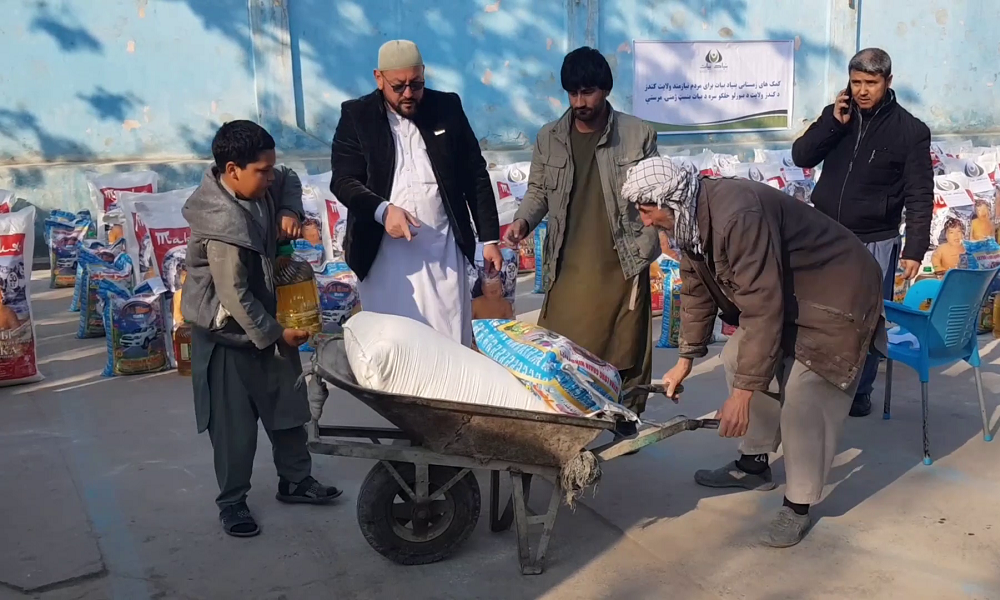
As part of its ongoing commitment to supporting needy families in winter in Afghanistan, the Bayat Foundation has once again provided essential food aid to hundreds of needy families in Kunduz province.
The Bayat Foundation’s representative in the northeastern zone, Khair Mohammad Saljoqi, explained that the relief packages included flour, rice, and oil, which were distributed to the needy after a thorough survey.
He stated: “The Bayat Charity Foundation continues its annual winter aid distribution [program]. This year, we have prepared winter relief packages for the needy in Kunduz, and today we are witnessing the distribution.”
Meanwhile, recipients have expressed their gratitude for the timely delivery of the relief packages and have called for further assistance from other humanitarian organizations for impoverished families.
One of the aid recipients, expressed his appreciation, saying: "We are very grateful to the Bayat Foundation."
Another recipient said: “We are very happy that the Bayat Foundation has helped the poor people. May God give strength to the Bayat Foundation to continue helping needy families, as it is winter, the weather is cold, and there is no work.”
Additionally, several women, who are the sole breadwinners for their families, shared that they have no food or warm clothing to get them through winter and are in desperate need of such assistance.
They also thanked the Bayat Foundation for their assistance.
Rukhshana, one of the recipients, said: “Please help us. We don’t have a breadwinner at home. I have small children. Traders should help us. We have no firewood, no coal. We thank the Bayat Foundation for helping us.”
The Bayat Foundation is a stalwart in terms of assisting needy people, not only through its winter food aid campaign but also in times of disaster.
Foundation officials have meanwhile stressed that given the growing poverty and worsening hardships people are facing in the country, their winter aid program will continue to be rolled out to other provinces.
Latest News
India hoping to import coal and marble from Afghanistan

A high-ranking delegation from India's Gujarat Chamber of Commerce has expressed interest in importing coal and marble from Afghanistan and investing in Afghanistan's coal mining sector.
The officials expressed interest at a meeting with Ikramuddin Kamil, acting head of the Afghan consulate in Mumbai, India.
Kamil assured them that he would facilitate an online meeting at a technical level with the relevant Afghan institutions in this regard.
He said security is ensured in Afghanistan, corruption does not exist and there are investment opportunities for Indian businessmen.
-

 Latest News4 days ago
Latest News4 days agoAfghanistan seals T20I series victory over Zimbabwe
-

 World4 days ago
World4 days agoSyrian clerics in former Assad stronghold call for national unity, democracy
-

 Latest News5 days ago
Latest News5 days agoDAB has collected over 7 billion Afghanis in worn-out banknotes over past year
-

 Latest News4 days ago
Latest News4 days agoU.S. sentences Afghan man to 30 years in prison for narco-terrorism and witness tampering
-

 International Sports3 days ago
International Sports3 days agoMessi vs Ronaldo: A look at their market values over the years
-

 Latest News4 days ago
Latest News4 days agoChinese, Tajik officials discuss Afghanistan
-

 Latest News4 days ago
Latest News4 days agoInvestment in Afghanistan’s pharmaceutical sector reaches $300 million: Union
-

 Sport4 days ago
Sport4 days agoAfghanistan’s Gulbaddin Naib fined 15% of match fee for dissent

